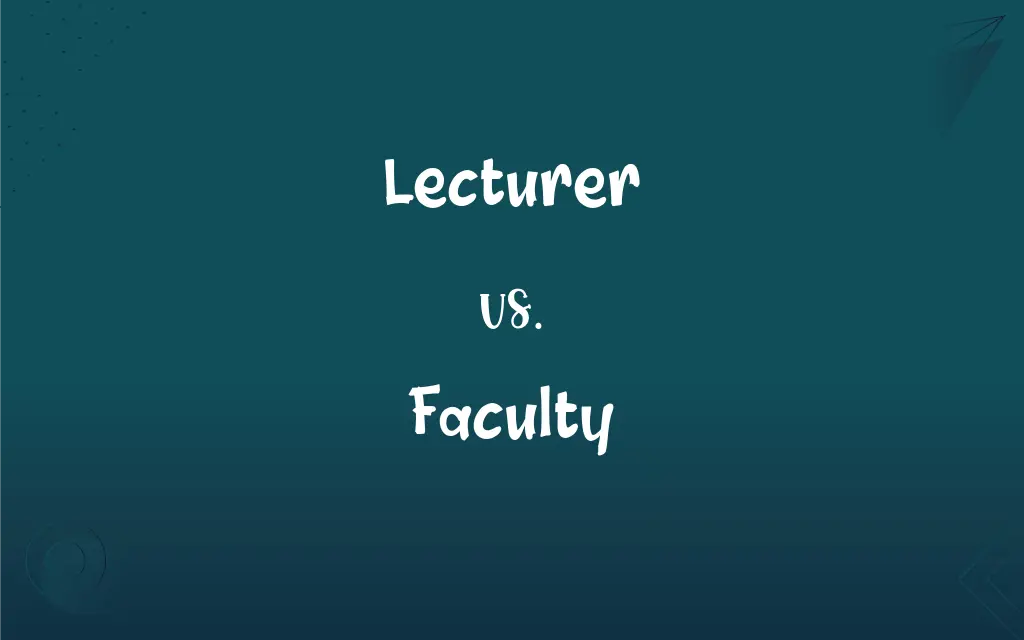Lecturer vs. Faculty: What's the Difference?
Edited by Aimie Carlson || By Harlon Moss || Updated on February 5, 2024
"Lecturer" is an academic rank or a person who gives lectures, usually in a university. "Faculty" refers to the teaching staff of a university or college, or a division within a university.

Key Differences
A lecturer is an individual who holds a specific position within the academic staff of a university or college, primarily responsible for delivering lectures and teaching courses to students. The term "faculty," on the other hand, encompasses the collective body of teachers, lecturers, professors, and academic staff responsible for education within a university or college. While a lecturer focuses on teaching and possibly research within their field, faculty represents a broader category that includes various ranks and roles in the academic hierarchy.
Lecturers are often seen as specialists in their subject area, dedicating their time to educating students, conducting research, and contributing to their field's academic discourse. Faculty, however, refers not only to individual educators like lecturers but also to professors, associate professors, and other academic staff, each contributing differently to the institution's educational and research goals. This distinction highlights the lecturer's role within the larger framework of faculty, underscoring their importance in the academic community.
In many academic institutions, becoming a lecturer is a step in the career path of academia, with potential progression to senior lecturer, associate professor, and professor. The faculty encompasses all these roles, providing a structure for governance, curriculum development, and academic standards within the institution. The relationship between a lecturer and faculty is thus integral, with the lecturer being a part of the faculty, contributing to its mission of education and research.
The terms "lecturer" and "faculty" also reflect different aspects of academic life. A lecturer's responsibilities are primarily centered around teaching and, in some cases, research. In contrast, the faculty includes administrative and leadership roles, such as department heads and deans, who contribute to policy-making, academic planning, and the strategic direction of the institution. This distinction underscores the varied functions and contributions of lecturers and faculty members to academic excellence and institutional success.
Comparison Chart
Definition
An academic rank or individual who teaches in universities.
The collective body of teaching staff at a university.
ADVERTISEMENT
Role
Primarily teaching and possibly research.
Teaching, research, administration, and governance.
Position
Specific academic rank within the faculty.
Refers to all academic ranks including lecturers.
Responsibilities
Delivering lectures, conducting research.
Education, research, policy-making, curriculum development.
Contribution
Specialized subject teaching and research.
Comprehensive educational and institutional support.
Lecturer and Faculty Definitions
Lecturer
Someone who delivers educational lectures to students.
As a lecturer in philosophy, he sparked deep discussions among his students.
ADVERTISEMENT
Faculty
The collective body of teachers and educators in an educational institution.
The faculty meeting addressed upcoming curriculum changes.
Lecturer
A member of the academic staff at a higher education institution.
She became a lecturer after completing her PhD.
Faculty
The inherent powers or capabilities of an individual, often in a specific context.
Critical thinking is an important faculty in academic research.
Lecturer
An academic professional who teaches courses at a university or college.
The lecturer prepared the lecture notes for the upcoming class.
Faculty
Academic staff with various ranks, including professors and lecturers.
The university's faculty is renowned for its research contributions.
Lecturer
A title reflecting a specific academic rank.
He was promoted to senior lecturer due to his exceptional teaching record.
Faculty
A division within a university dedicated to a specific area of study.
She joined the Faculty of Arts and Humanities last year.
Lecturer
An educator who may also engage in research within their field.
The lecturer published several papers on renewable energy technologies.
Faculty
A group responsible for academic governance and policy-making.
The faculty senate voted on the new academic policy.
Lecturer
One who delivers lectures, especially professionally.
Faculty
An inherent power or ability
The faculty of speech.
Lecturer
A member of the faculty of a college or university usually having qualified status without rank or tenure.
Faculty
A talent or natural ability for something
Has a wonderful faculty for storytelling.
FAQs
What does faculty mean?
Faculty refers to the collective body of teaching and administrative staff at a university or college.
What is a lecturer?
A lecturer is an academic rank or person who delivers lectures and teaches at universities.
Is being a lecturer the same across all universities?
The role and rank of a lecturer can vary by university, country, and academic discipline.
What roles do faculty members have besides teaching?
Faculty members may also engage in research, administrative duties, and academic governance.
What is the difference between a lecturer and a professor?
A professor is a higher academic rank than a lecturer, often involving more research responsibilities.
Can faculty members hold administrative positions?
Yes, faculty members can hold various administrative roles, such as department heads or deans.
How does one become a lecturer?
Becoming a lecturer typically requires advanced degrees in the relevant field and often teaching experience.
Are all faculty members involved in research?
While many are, the extent of research involvement can vary depending on the institution and role.
How do lecturers contribute to their academic fields?
Lecturers contribute through teaching, mentoring students, and conducting research.
What qualifications are needed to join the faculty?
Qualifications include advanced degrees and, for certain positions, significant research or teaching experience.
Can a lecturer be part of the faculty?
Yes, a lecturer is a member of the faculty, contributing to teaching and possibly research.
How important is faculty development?
Faculty development is crucial for maintaining teaching excellence, research productivity, and adapting to educational trends.
Do lecturers have a say in university governance?
This can vary, but lecturers often participate in departmental decisions and may have representation in governance bodies.
How does faculty diversity impact a university?
Faculty diversity enriches the academic environment, offering a range of perspectives and enhancing student learning.
What makes a good lecturer?
Good lecturers are knowledgeable, engaging, passionate about teaching, and skilled at communicating complex ideas.
What challenges do lecturers face?
Challenges include balancing teaching and research, adapting to new teaching technologies, and engaging diverse student populations.
What trends are impacting faculty roles?
Trends include increased focus on online learning, interdisciplinary research, and greater emphasis on diversity and inclusion.
What is the impact of faculty on student success?
Faculty have a significant impact on student success through teaching, mentorship, and creating an engaging learning environment.
Can faculty status change over time?
Yes, faculty members can be promoted to higher ranks based on their contributions to teaching and research.
How do lecturers and faculty members stay current in their fields?
They stay current through ongoing research, professional development, and engagement with academic communities.
About Author
Written by
Harlon MossHarlon is a seasoned quality moderator and accomplished content writer for Difference Wiki. An alumnus of the prestigious University of California, he earned his degree in Computer Science. Leveraging his academic background, Harlon brings a meticulous and informed perspective to his work, ensuring content accuracy and excellence.
Edited by
Aimie CarlsonAimie Carlson, holding a master's degree in English literature, is a fervent English language enthusiast. She lends her writing talents to Difference Wiki, a prominent website that specializes in comparisons, offering readers insightful analyses that both captivate and inform.































































